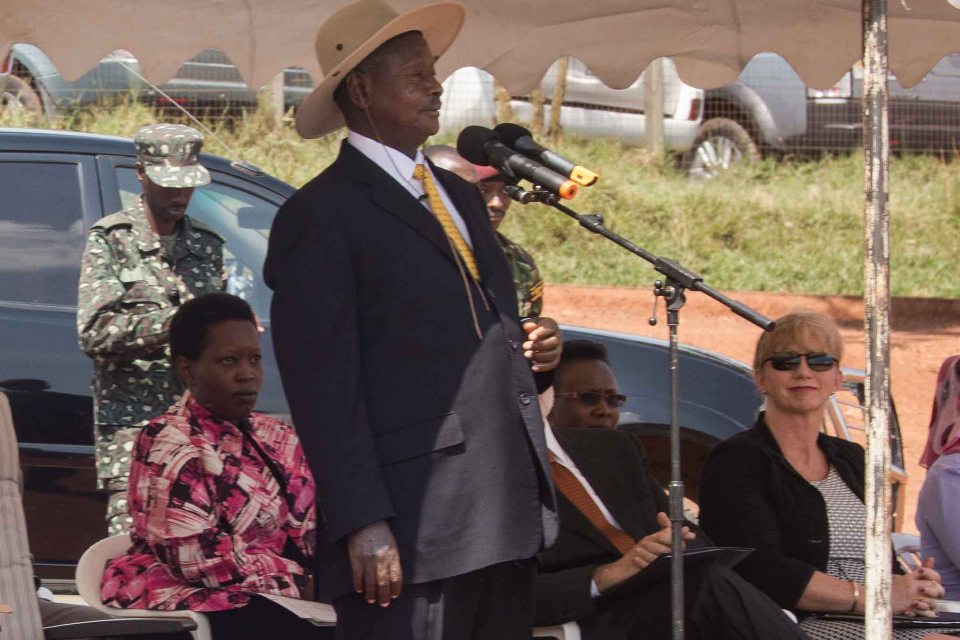UK High Commissioner supports Uganda's universal bednet campaign
British High Commissioner speaks at campaign closing event on 16 August.

On 16 August, HE Alison Blackburne, British High Commissioner to Uganda, gave a speech on the importance of universal bednet coverage in Uganda, a programme which the UK is funding to help bring about a dramatic reduction in deaths from malaria. Also present at the event were HE Yoweri Museveni, President of Uganda, Hon Ruhakana Rugunda, Ugandan Health Minister, and the US Ambassador to Uganda, HE Scott DeLisi. During her speech, the High Commissioner outlined further UK funding of £34million to the universal bednets over the next three years.
The speech delivered by the High Commissioner at the event was as follows:
His Excellency Yoweri Kaguta Museveni, President of the Republic of Uganda
Honourable Ministers
The Ambassador of the United States
Representatives from Uganda’s development partners
Distinguished guests, ladies and gentlemen,
I am delighted to be here today to join you, Your Excellency, in marking this significant point in the universal coverage campaign, and the support that the UK is giving, in partnership with others, to Uganda to face one of its biggest health challenges - malaria.
Malaria kills six hundred thousand children and adults in sub-Saharan Africa every year, and Uganda is one of the countries worst affected. Uganda has one of the highest prevalence rates of malaria in children in the world. And the vast majority of deaths from malaria are children under five.
That is a tragedy for those children and their families, and for Uganda as a nation. But we know that we can do something about it. Proper use of treated bednets has been shown to reduce significantly the number of deaths, and cases of malaria more generally.
So this universal coverage programme will save tens of thousands of children from dying over the next three years. Many thousands of families will be spared the unspeakable grief of losing a child. And those children will be able to contribute to building Uganda’s future. That in itself is a reason to support this programme, and the UK is proud to do so.
But this programme will also bring other benefits.
The burden of malaria falls most heavily on the poorest people in Uganda, through death of family members, sickness, and lost income. So this campaign –providing every household in Uganda with at least one net, completely free of charge - directly helps the poorest and most vulnerable members of society.
But beyond these very noble reasons for this programme, it also makes great economic sense. Decades of rigorous research show us that insecticide treated bednets are one of the most cost-effective public health interventions in the world. Malaria is estimated to reduce GDP growth by up to 1.3 per cent per year, in countries with high prevalence rates. Treating malaria costs a family on average 25 thousand shillings per episode – adding up to a significant proportion of annual income for many households.
Workers suffering from malaria may be unable to work for up to twenty days at a time, and may suffer several episodes in a year. So malaria has a major impact on businesses and livelihoods, as well as on individuals and households.
And, back to children – Uganda’s future - severe malaria damages a child’s performance at school in which their parents have invested hard-earned income. Not only that. Preventing malaria today reduces costs for the health system tomorrow – tests, treatment, transport, beds and staff are all expensive.
Your Excellency, ladies and gentlemen,
Uganda’s universal coverage campaign is ambitious. It is the largest attempt in the world to distribute bednets to every household. Bednets are the cornerstone of malaria prevention, but not the only part. The end of the campaign which we are marking today is only the end of the first stage of the programme.
Campaigns must be followed by effective communication, to convince people to stop practices like the ones we read about in the newspapers this week, where people have been using nets for fishing and not preventing malaria. I am confident that these cases represent a tiny minority. But we need to continue to ensure that everyone gets the messages about correct use. Campaigns must also be followed by steps to ensure that the health system has replacement nets on standby for pregnant women and children.
The UK is happy to be providing a further thirty-four MILLION pounds, or one hundred and forty-five BILLION shillings to help Uganda take forward these, and other steps, over the next three years. This is a small part of the UK’s continuing firm and uninterrupted support to Uganda’s development . We would like to see the Government of Uganda, your excellency, step up its funding for malaria, implementing some of these excellent investments.
The UK is proud to be a partner in this important anti-malaria programme.
I commend the Ministry of Health for its leadership of the campaign, especially National Malaria Control Programme staff.
I also commend the health workers and village health teams involved in distribution of nets, and the police and UPDF who provided essential and effective security.
I would also extend congratulations and thanks to USAID and the US Centers for Disease Control and Prevention who have been important partners for the Ministry of the Health, providing significant funding, but also technical and other support.
The Malaria Consortium has provided invaluable logistics expertise and has done an incredible job.
We can be proud of what we have achieved together so far. And the UK looks forward to continuing our work in this partnership in the next stage of the programme.
Thank you